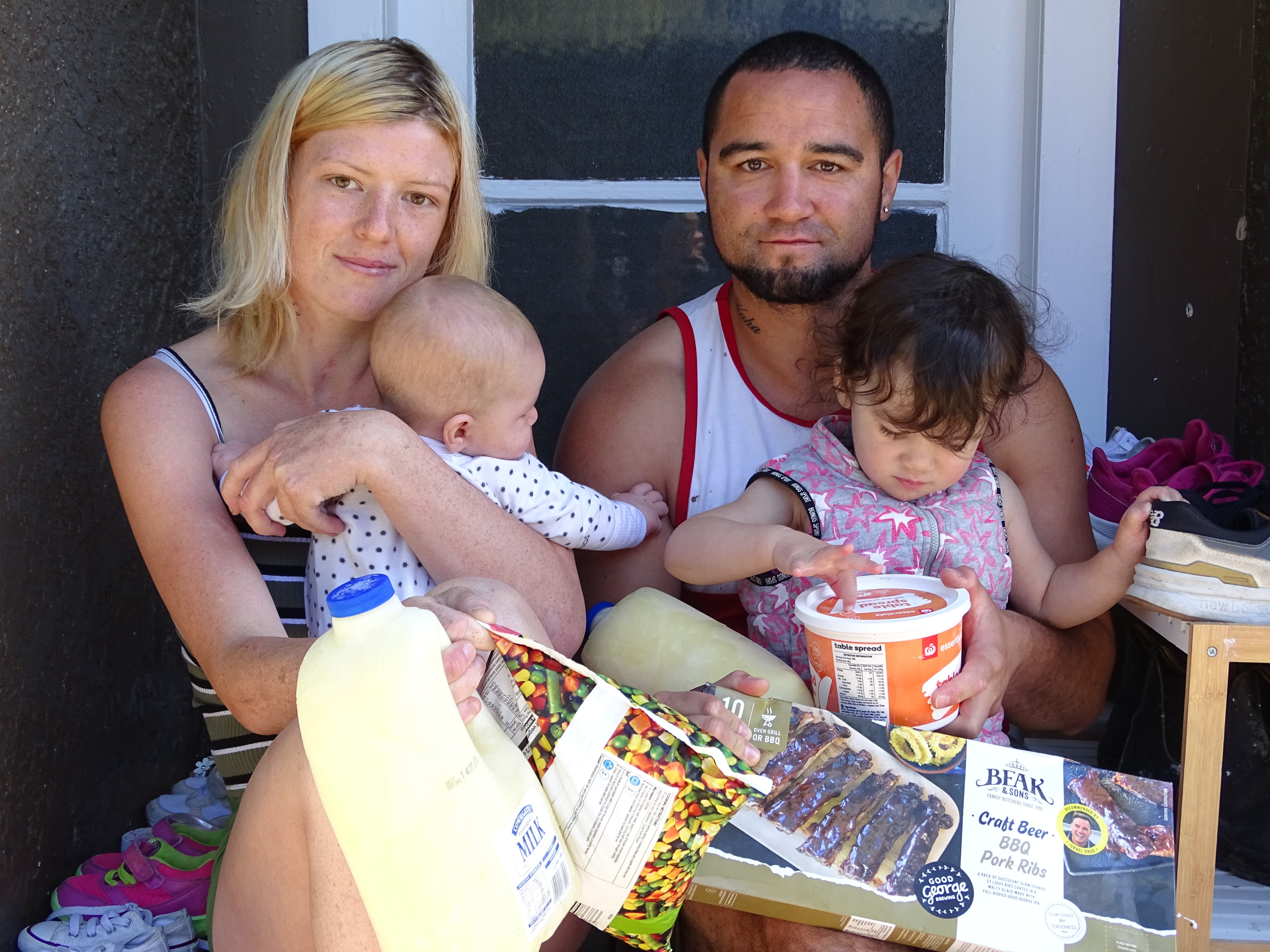Less spent on food as costs bite


Corren Anderson-Melville and partner Luke Kirk are searching for ways to spend less on food for their family which includes Everest, four months, and Sahara, two. Photo: Anne Hardie.
More Nelsonians are trying to access Kiwisaver to get themselves out of debt as the cost of living continues to rise, while many families are spending less on food so they can pay their bills.
Nelson Budgeting Services’ coordinator Tessa Bell says food is the one cost each week that people can reduce and some single adults seeking the service’s help are spending as little as $38 a week on food, while couples are usually less than $100 a week.
Though the minimum wage has just increased to $22.70 per hour, the independently-calculated living wage which is paid on a voluntary basis by employers is moving up to $26 per hour.
The living wage is voluntary for employers who want to make sure their workers get enough money to thrive and not just survive.
However, Tessa says the costs just keep going up to counter any higher wages and the service is now getting people seeking budgeting advice pre-emptively because they see looming financial problems.
One of those problems is refixing interest rates on mortgages which she says can double their mortgage payments each week or more.
“We’re seeing more and more people trying to access Kiwisaver to get themselves out of debt and trying to work out how to pay for everything. For a lot of families, food falls off the bottom. There are grown adults on $38 a week, which is not enough – there’s a lot doing that.
“We have people wanting to spend $250 a week on food, but when you’ve done their budget, there’s no way they can.”
The Reserve Bank raised the official cash rate to 5.25 per cent last week and she expects there will be another rise to come which puts more pressure on those already struggling financially.
Families are also trying to find ways to eat healthily for less which is why Luke Kirk reached out on Facebook for ideas. He was swamped with feedback from people with a wide range of budgets and it led to further posts on buying healthy food within a tight budget and where to shop.
Luke and his partner Corren Anderson-Melville spend about $200 a week on food for their family that includes a two-year-old, four-month-old baby, two dogs and two cats, but they need to spend less. Luke is a self-employed handyman and says they live from week to week financially, which means an unexpected bill affects their food budget.
“We’re looking at reducing costs as much as we can,” Corren says. “But there’s only so much you can reduce, so food is the one thing we can reduce.”
Luke says he grew up on a low-quality diet and he is determined his family will have good, nutritious food even when the budget is tight, which is why he sought ideas. They already shop around and use a chest freezer to stock items including milk so they have basics for those weeks when an unexpected bill reduces their spending.
“To live right you have to eat right and the cheapest food is often not good food. I’d love to be able to buy more so we have everything our bodies need, but it’s so expensive.”
Tessa says multiple issues have compounded the financial challenges in the region.
Last year’s flood event increased the need for alternative accommodation for many people, and then there are the increased costs across the board.
She personally has a life insurance policy that has just had a premium hike of 38 per cent and she says other insurances are all on the rise.
She is a huge supporter of the living wage because she says it gives people “a little bit of dignity”, even if the money does go straight out the door on essentials.
“The living wage isn’t an extravagant amount of money and we think it is incredibly important for people to be able to participate – to be able to have those things we take for granted.”
She also has empathy and understanding for employers who are paying more in wages and says it is a lose-lose situation for employers and employees.
As more people struggle to pay their bills and have less for food, Tessa says there is an increased need for food parcels and many people will be going through incredible stress.
“We don’t talk enough about the mental health issue of financial stress.
“Social support is really valuable in the community right now for people to make it through and we don’t know where it is going to end.”
